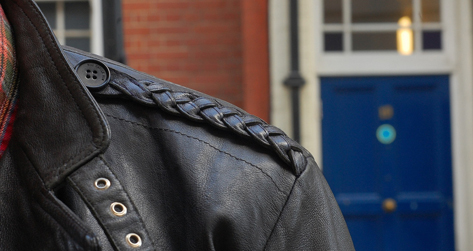Originally posted – Oct 25, 2013
If you offer a wash-dry-fold service, you will from time to time take in some leather garments. But don’t be afraid of them.
Leather cleaning is one of the easiest types of cleaning you can do, since most stains don’t really soak into leather like the do with fabrics like cotton.
After all, leather garments are essentially the hide of an animal that has gone through the tanning process – where it has been waterproofed, dyed and then heat-treated to seal in the dye so that it doesn’t come off. Some leather garments are polished to a bright shine, while others are left looking rougher and coarser.
(As a side note: don’t mistake suede items for leather. Yes, some suede garments are indeed made of leather; however, much more often these items are not leather at all.)
Since leather is the hide of an animal, it helps to think about what happens to our own skin when we expose it to moisture and chemicals – it can cause our skin to tend to dry out and even crack. This is why it’s so important to use the right types of chemicals and conditioners when cleaning leather items. These are products you can purchase from your local chemical supplier.
Consider what you do after you wash your hair; most likely, you use some sort of conditioner to re-moisturize your scalp and hair. And that’s basically what you should do with leather. Wash it with a conditioner, and be sure not to use any harsh chemicals on the garments. Again, for the most part, stains on leather will come off with a basic washing.
At my store, we wash leather in soft cycles with either warm or cold water. Then, we let the garment air-dry for a day or two, until it’s completely dry. At this point, the item will be very stiff, despite the conditioners you’ve used during the wash process. Place the garment in a dryer for 20 to 30 minutes, where the heat and mechanical action will soften it up.
Next, treat it again with a conditioner to re-soften it further. If the garment has more of a satin finish, skip this last step. However, if it has a shiny finish, you can treat it with a conditioner that you can simply wipe on and then wipe off.
As a rule of thumb, the shinier the leather item, the better the chances of cleaning it successfully, because the process used to seal in the dye is more intense with shinier leather – thus, such items tend to retain their look.
The big challenge with cleaning leather is the fact that some animal hides will hold the dye well and some will not. Typically, the cheaper leather garments won’t.
On average, one out of every 10 or 20 leather garments you clean will be ruined in some way – the dye is going to come off either parts of the garment or the entire item. In such cases, you have to have the ability to re-dye the garment, or know someone who does. That’s what separates professional leather cleaners from drycleaners and other launderers – they have the dyes and the heat-treating process to re-dye leather.
As a result, I have an account with a local leather cleaner. Leather cleaning is a niche market, which depends heavily on its “retail network” of drycleaners and other businesses, such as self-service laundries. Leather cleaners like having several retail shops from which to pick up products, so they typically charge reasonable wholesale-type prices.
It’s not hard to set up a relationship with a leather cleaner. If you’re doing a significant amount of wash-dry-fold business, there is no need to go through a drycleaner for any extensive leather care. Set up your own account directly with your local leather cleaner.
With that said, don’t break into a cold sweat the next time a customer brings in a leather jacket. With gentle cycles, mild water temperatures and the right chemistry, you can handle most leather garments that come your way.












